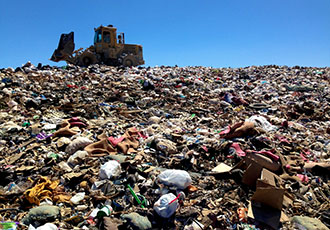How to Brexit-proof your construction business

The currency fluctuations caused by Brexit have pushed up the cost of materials, making construction waste savings a real priority for many in the construction industry. Paul Cox of waste management and recycling solutions Reconomy, explains.
The construction industry is facing uncertain times as a result of last June’s referendum on Britain’s membership of the EU. This uncertainty has begun to have real effects, with a fluctuating pound pushing up the cost of construction materials.
Some authorities have predicted the loss of up to eight percent of construction jobs. Others are looking at unexpected growth last autumn as a sign that the industry won’t be harmed. A Government review is currently in process, but nobody knows for certain what Brexit will mean for construction companies.

The only certainty then, is uncertainty. However, uncertainty isn’t an excuse for inaction. There are things that all construction companies can start to do to minimise the impact of a painful Brexit, or ensure that you’re positioned to capitalise on a positive Brexit.
No matter what happens to the industry, looking for construction waste savings as prices for raw materials rise, will help prepare you to weather a storm or seize an opportunity. There’s no need to wait for the outcome of negotiations to start taking positive steps. You can start looking for savings today, ensuring that you’re closer to being Brexit-proof no matter what happens.
1. Improve your planning
The construction industry is currently wasting 100 million tonnes of material each year. Forget about the landfill costs for a second – that’s material you’ve paid for that’s being wasted. You’ve already paid once, and now you’ll need to pay again to get rid of it.
Your first step to look for savings then, is to improve your planning. If you stop over ordering, you’re making a saving before you even start thinking about waste management. Take the extra time to plan out your storage, and you’ll lose even less expensive material to environmental damage.
2. Find opportunities for re-use
Even the best laid plans are going to create waste. There will always be something left over on-site, but that doesn’t mean it should be destined for landfill. If you’ve properly segregated your waste, you may well find that off-cuts are still in a useable condition for a different purpose.
If you can’t find a use for your leftovers, there’s still an opportunity to avoid the landfill fees. Trading your excess materials with companies that need them will keep your waste management costs down, and looking for opportunities for the material you need will keep purchasing costs in check too.
3. Look for economies of scale
Larger organisations always find a better bulk deal. That’s just the way the world works. However, it can be used to your advantage. If you can find a waste management company, you’ll benefit from the sort of cost efficiencies that only come from nationwide networks.
What’s more, larger waste management companies may well have already started their own Brexit-proofing plans. Plans that will almost certainly include finding their own waste management savings and passing them on to businesses.
4. Keep an eye on the legislation
Just because the civil service has its hands full untangling decades of EU laws and their effects on the UK doesn’t mean that it’s not keeping a close eye on the construction industry’s compliance with legislation. Companies that fall foul of the rules are still going to suffer financial penalties that are harsh enough to offset the good work of all your waste management savings efforts.
Of course, if you’re too busy to keep abreast of the latest rules and regulations – let alone handle the paper trail that comes with compliance, a dedicated waste management company will definitely be able to help.
No matter the final form of Brexit, be it hard, soft or somewhere in the middle, looking for sensible, practical savings will make sure that your business is prepared to survive and thrive.
By looking for ways of reducing the waste you generate, and finding partnerships to reduce your costs and keep you compliant with environmental legislation, your construction firm will be on a firm footing. And if the foundations of that firm footing includes reused and recycled waste, then so much the better.
Takeaways:
- The Brexit vote has led to uncertainty within the construction industry - but there are practical steps that businesses can take today.
- As material prices rise, better planning can keep initial outlays down and generate savings on landfill costs.
- Re-using expensive materials will help businesses generate less waste and save money at the same time.
- Economies of scale will always work in your favour - which is why finding a national waste management partner is in your best interests.
- Uncertainty isn’t an excuse to lose sight of waste management legislation changes. Keeping abreast of the rules will prevent costly fines and fees.
Similar articles
More from Electronic Specifier
- Building the case for construction offices in 2021 20th May 2021
- UK construction: is the industry finally on the up? 26th August 2020
- Speaking to a younger generation of women in tech 11th August 2020
- Engineering firms encouraged to get ‘2020’ vision 6th January 2020












Write a comment
No comments